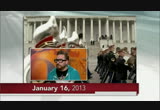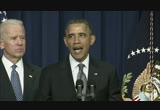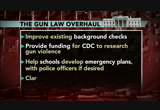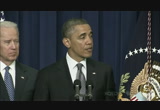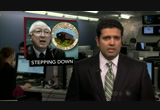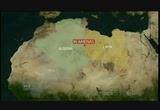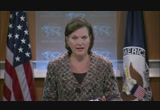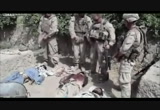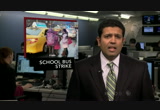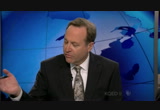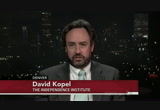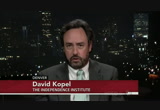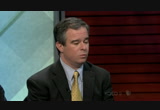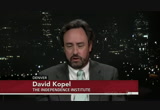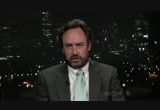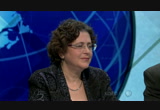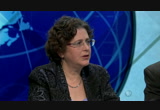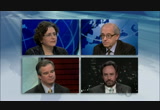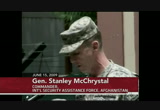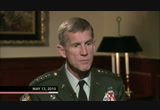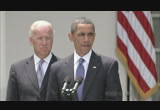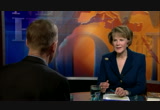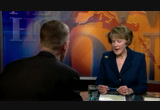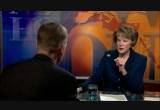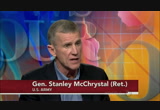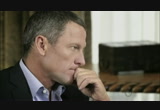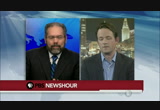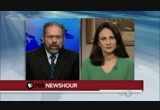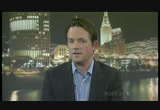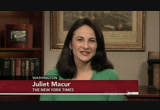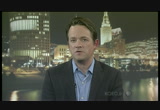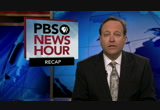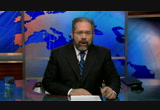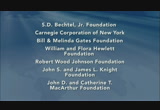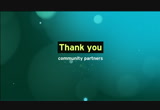tv PBS News Hour PBS January 16, 2013 3:00pm-4:00pm PST
3:00 pm
campaign's internet guru, harper reed. >> we basically built what amounted to an ad-tech company, but instead of targeting ads on the internet, of course we did that, we really maximized the targeting that's physical. what that means is we're not wasting anyone's time. >> brown: and we examine the fallout from tour de france champion lance armstrong's admission that he used performance enhancing drugs. >> brown: that's all ahead on tonight's "newshour." >> major funding for the pbs newshour has been provided by: >> and with the ongoing support of these institutions and foundations. and friends of the newshour.
3:01 pm
and... >> this program was made possible by the corporation for public broadcasting. and by contributions to your pbs station from viewers like you. thank you. >> suarez: president obama called today for what amounts to a national awakening to stop gun deaths in america. he detailed an action plan, all the while acknowledging that the most far-reaching measures face tough going in congress. >> we can't put this off any longer. >> suarez: with that, the president laid out his strategy, before an audience of congress members, cabinet advisors, and the families of those killed in the school shootings in newtown, connecticut. >> in the month since 20 precious children and six brave adults were violently taken from us at sandy hook elementary, more than 900 of our fellow americans have reportedly died at the end of a gun-- 900 in the past month.
3:02 pm
and every day we wait, that number will keep growing. so i'm putting forward a specific set of proposals based on the work of joe's task force. and in the days ahead i intend to use whatever weight this office holds to make them a reality. >> suarez: the president then offered the most far-reaching proposals to curb gun violence since at least the clinton administration. they include 23 steps he can take on his own, through executive action. among them, improving the system of background checks already in place for gun purchases. providing funding to study gun violence, including the effects of violent video games and entertainment. helping schools develop emergency response plans and hire resource officers, including police, if they want them. and clarifying that mental health providers are allowed to report patients who make violent threats. joining the president on stage as he signed those executive orders were four children who'd written to him, following the
3:03 pm
massacre at sandy hook elementary. but mr. obama acknowledged that the most significant reforms will not come from his office. >> as important as these steps are, they are in no way a substitute for action from members of congress. to make a real and lasting difference, congress too must act, and congress must act soon. and i'm calling on congress to pass some very specific proposals right away. >> suarez: for one thing, the president is asking the senate to confirm todd jones as director of the bureau of alcohol, tobacco, firearms and explosives, where he's been interim director. the a.t.f. has had no permanent head for six years. other proposals include: barring the sale of ammunition magazines with more than ten rounds and reinstating and strengthening a ban on military assault-style weapons.
3:04 pm
>> a majority of americans agree with us on this. and by the way, so did ronald reagan, one of the staunchest defenders of the second amendment, who wrote to congress in 1994 urging them-- this is ronald reagan speaking-- urging them to listen to the american public and to the law enforcement community and support a ban on the further manufacture of military-style assault weapons. >> suarez: additionally, the obama plan calls for congress to order background checks for all gun sales, ending the so-called "gun show loophole." and it seeks stiffer penalties for people who sell guns to criminals. all told, the plan would cost some $500 million. and president obama said, "it's going to take some heavy political lifting." >> this will be difficult. there will be pundits and politicians and politicians and special interest lobbyists publicly warning of a tyrannical all-out assault on liberty, not because that's true but because
3:05 pm
they want to gin up fear or higher ratings or revenue for themselves. and behind the scenes they'll do everything they can to block any common-sense reform and make sure nothing changes whatsoever. >> suarez: even before the president spoke, david keene, head of the national rifle association, dismissed the plan, in an interview with judy woodruff last night on "the newshour." >> the problem that we have is that none of the things that they have suggested are going to do any good. they're asking the question, judy, what do we do about guns? the question should be, what do we do to prevent the kinds of things that happened in connecticut? and we don't think that they're asking that question, but they're pursuing their own agenda. >> suarez: today, the n.r.a. said it will focus on securing schools, fixing the mental health system and fully prosecuting violent criminals. the group also struck sparks with the release of this web ad late tuesday. >> are the president's kids more important than yours?
3:06 pm
then why is he skeptical about putting armed security in our schools when his kids are protected by armed guards at their schools? mr. obama demands the wealthy pay their fair share of taxes, but he's just another elitist hypocrite when it comes to a fair share of security. protection for their kids and gun-free zones for ours. >> suarez: today, a white house spokesman called the ad with its use of the obama children repugnant and cowardly. >> brown: coming up, we'll have reaction to the president's approach. also ahead: general stanley mcchrystal; the obama campaign's online push and a cyclist's confession. but first, the other news of the day. here's hari sreenivasan. >> sreenivasan: president obama is losing another member from his first-term cabinet. interior secretary ken salazar announced today he will step down in march, after four years on the job. salazar pushed for greater conservation and renewable energy. and, he oversaw a moratorium on offshore drilling after the b.p. oil spill in 2010. industry groups said the shutdown cost thousands of jobs, but salazar defended it today in
3:07 pm
his departure statement. attackers in algeria stormed a b.p. natural gas complex today and took dozens of foreigners hostage, including seven americans. at least two people were killed. one was british. the nationality of the other was unclear. we have a report from chris ship of "independent television news." >> reporter: the gas facility in southern algeria which early this morning was attacked by a group, claiming to be islamist militants, and where tonight that group is holding several hostages-- a number thought to be british. another briton who worked here is reported to have been killed. a jihadist group with links to al qaida in northern africa claims its holding 40 hostages. this man-- mokhtar belmoktar-- claimed yesterday days they were seeking retaliation for the french military action in mali. a day later the algerian gas field was attacked. the gas field is at a site in southern alergia called in amenas. it is on the border with libya, but algeria also shares a border with mali. across this area of north africa al qaida inspired militants have been growing in numbers and growing in strength.
3:08 pm
>> ultimately, across the entire north african reason, a lot of these islamists we see come from roughly the same group which is a fragmented and splintered group that's been reinforced as mostly after the fall of moammar qaddafi in libya and the flood of weapons that it's released. >> reporter: the action in neighboring mali against islamist militants is led by the french, although u.k. transport planes have helped to ferry supplies. tonight the group claiming to have kidnapped the gas workers demanded an end to that operation in return for their safety. >> in washington, a spokeswoman at the state department confirmed that americans were involved, but she would not say more. >> i hope you will understand that in order to protect their safety, i'm not going to get into numbers. i'm not going to get into names. i'm not going to get into any further details as we continue to work on this issue with the algerian authorities and also with their employers. defense secretary leon panetta said the u.s. would take "all necessary steps" to deal with the attack and hostage taking.
3:09 pm
in syria, car bombers targeted the northern city of idlib today. state media said at least 22 people died. the opposition said it was 24-- most of them, government troops. the attacks came a day after two large explosions killed 87 people at the main university in aleppo. classes were suspended today. iraq witnessed its own string of bombings that killed at least 33 people. the city of kirkuk suffered the worst attack when a car bomber blew himself up outside the offices of a major kurdish party. 21 people were killed in that bombing and another nearby, and nearly 200 were wounded. a u.s. marine pleaded guilty today to urinating on the remains of dead taliban fighters in afghanistan. staff sergeant edward deptola submitted his plea at camp lejeune, north carolina. images of the incident surfaced last year, sparking an international furor and outrage in afghanistan. another marine pleaded guilty to similar charges last month. three others were given administrative punishment. the two biggest airlines in japan grounded all of their
3:10 pm
brand new boeing 787 dreamliners today. the move came after one of the planes had to make an emergency landing in western japan. the crew reported a burning smell, and a cockpit message showed battery problems. it was the latest in a series of incidents involving the 787's. as a result, all nippon airways and japan airlines voluntarily grounded the jets for safety checks. boeing's troubles rippled down wall street. the aircraft maker's stock sank 3%, and that dragged the dow jones industrial average down 23 points to close at 13,511. the nasdaq rose six points to close at 3,117. also today, two more big banks agreed to settle federal complaints that they abused the home foreclosure process. goldman sachs and morgan stanley will pay a combined $557 million. more than 8,000 school bus drivers in new york city are now on strike. they walked out early today, in a dispute over job security. the strike forced 150,000 students, many of them disabled to find alternative transportation. most of new york city's million-
3:11 pm
plus students take public transit or walk to school. those are some of the day's major stories. now, back to jeff. >> brown: and we return to the president's proposal today on gun control, mental health and school safety. we get four perspectives on the ideas, the realities of implementation and the difficulties of passing new legislation. josh horwitz is the executive director of the coalition to stop gun violence. david kopel is an adjunct professor of constitutional law at the university of denver and a gun-rights advocate with the libertarian-leaning independence institute. dr. liza gold is a clinical professor of psychiatry at georgetown university and vice president of the american academy of psychiatry and the law. and norm ornstein is a longtime congress watcher and a scholar at the american enterprise institute. welcome to all of you. i want to start with you, josh horowitz. what's the most important aspect of what you heard the president say? >> well, first of all, i think it's great that we're having this conversation today and this day is a long time coming.
3:12 pm
and what i heard at the white house today was very exciting which is that the president wants to have -- ask congress to have background checks on all gun sales. right now, as you know, only about 60% of the gun sales in america have background checks. we believe there's no reason for criminals to be able to avoid the background check system an we welcome this proposal. >> reporter: so the background checks is what jumped out as important to you? >> a lot of great things happened today. there was four top agenda items including assault weapons ban, high capacity magazine ban and anti-trafficking law. those things are incredibly important and we don't have those. the assault weapons ban expired in 2004. these are important pieces of an overall comprehensive program. >> brown: david kopel, what did you hear? what seemed most important in what the president said today? >> well, i think we had two positive things: one is he said he's going to work to i guess change the regulations or do something to facilitate it so gun stores if people who are not customers of the gun store but
3:13 pm
one guy is selling a gun to another and they want to come in and voluntarily go through the national instacheck system he's going to help the gun store facilitate that. and really in terms of expanding background checks to private sales, that's as far as you can go in a practical sense. criminals who are selling guns to each other, it's already illegal for them to do that. and they're not going to suddenly come in and start bringing their guns into gun stores for checks. but for the person who's selling a gun to someone he knows may be reasonably well but not absolutely it's a good thing to have that option. second, the president offered at least a start of all the things he said today there was only one that would have made any practical difference and could have stopped all those murders at newtown and that was armed guards in the schools. what his proposal-- which is -- doesn't have too much funding in it but at least it's a beginning-- is offer federal grants to some schools where
3:14 pm
they can hire another counselor if they want to or a school resource officer, basically a police officer who guards that school. we know that these attacks on schools and typically when a law-abiding person with a firearm shows up and the attacker crumbles and kills himself. so the soonier that happened it is better and if we can have more police protecting our schools from what is almost inevitably the copy cat crimes that this very intense media coverage seems to inspire, that's a great start. >> brown: i'm assuming you didn't like many of the legislative proposals? the ban? the assault weapon ban, for example? >> well, the department of justice conducted a study of the effectiveness of that ban published in 2004 after it had been in effect for mine years and concluded it had done absolutely no good. no lives were saved. there weren't fewer shots fired in shootouts with police officers or anything else. so it was -- it's a proven failure. connecticut's had a ban on
3:15 pm
so-called assault weapons in effect since 1993. obviously that didn't do any good at newtown. the problem is the bans don't have anything to do with how fast the guns fire or how powerful their bullets are, it's all based on these superficial things like whether the gun has a folding stock, whether there's a grip on it, whether the grip is in the right place or the wrong place. and that's really a trivial thing for us to be talking about when we should be talking about how to keep guns out of the wrong hands and make sure that there are guns in the right hands. >> pelley: you know what? before i go to the mental health -- let me come back to josh horowitz on that issue. >> well, look, i think the assault weapons we're talking about are short barreled rifles that take detachable magazines and have pistol groups. that allows you to keep the barrel on the target for a long period of time. there's no muzzle creep in those weapons, you have magazines up to 100 rounds. there's no use for those things. and a bunch of scholars got together last monday and tuesday at johns hopkins at a symposium and looked at different issues,
3:16 pm
they looked at the evidence and they recommended banning assault weapons and high capacity magazines. >> brown: i want to bring in dr. lori gold. from a mental health perspective, what did you hear good and bad that advances this? >> well, i think taking advantage of this opportunity to increase resources for mental health, resources in training for mental health to get regulations on board that create party in mental health insurance, to talk about guns in terms of people who are dangerous as opposed to gun and the mentally ill. i think it's been a big disservice to people who struggle with mental illness that these two subjects have been linked because the majority of gun violence in this country has nothing to do with mental illness and most people who are mentally ill are not violent. so to take it out of that context and put it back into a context of people who might be
3:17 pm
dangerous, a small section of those people, may have mental illness. but the increased training, awareness, focus on getting people identified and getting them referred to treatment is a good thing and long overdue and should be broadened, actually, from what was proposed today. >> brown: and limits and complexities are hard to implement, right? a lot of questions going on? >> they're right. because we don't a comprehensive mental health system in this country. it's almost a fallacy to call it a system. it's fragmented. treatment is difficult to access. often unaffordable. this is an opportunity in terms of complexity to actually move forward by addressing how do we go -- get a comprehensive mental health service? >> brown: norm, you've watched this before in a way, right? so put in the some larger context here of the -- of gun
3:18 pm
control politics. >> well, one thing to say, jeff, is that six months ago or a year ago if we had been having this conversation we would have said "there's no chance of doing anything here. congress has been completely intimidated by the n.r.a. at and the lesson they drew from the assault weapons ban-- even though there's evidence that it wasn't quite the case-- is that it was devastating to democrats who voted for it in 1994. president clinton says the same thing. the connecticut tragedy, the horrific tragedy, changed the context and public opinion on a dime and now we're moving into a completely different environment. it's not an environment so different that all of these things are going to happen. and an assault weapons ban is sill a heavy lift. remember, the assault weapons ban we had had a lot of loopholes in it. but the other elements, it's just a different world. and i think national rifle association is no longer supreme in the same way and many of
3:19 pm
their own members i think are going to start to feel differently. when you get a joe manchin of west virginia coming out and saying "i hunt, i don't need more than three bullets in a magazine" and you get other long-standing strong proponents of the second amendment saying it's time for some changes, we're moving into a different world. >> brown: david kopel, do you think the politics have changed here or do you expect -- well, there certainly will be challenges legislatively. will there also be challenges legally? >> there will certainly be legal challenges because one important thing -- the way things have changechanged is we now have the supreme court having affirmed that the second amendment is an individual right and the core of that individual right is self-defense. so joe manchin is welcome to his opinion-- which he's stated to people from his own state just a few days ago-- that he thinks the only reason people should have guns is for sports. but that's not what the second
3:20 pm
amendment says. the second amendment says that self-defense is the core of the second amendment. so when you talk about taking away things because maybe they're not used very often in deer hunting but they're critical to the second amendment, that's a real problem. for example: the typical handgun that a person owns today, whether for for protection in the home or for carrying, is the same kind of gun that police officers carry, that they're the best for self-defense and that is very frequent lay semiautomatic handgun with a magazine between 11 and 19 round. because the fact is lots of criminals don't go down and fall down after being shot once or twice, sometimes they're on methamphetamine or cocaine and they keep on going or other times a lone individual can be attacked by a gang. so the same reason that the police correctly choose these as the best for their job of defending themselves and others, ordinary citizens do the same. and maybe joe manchin doesn't care about that, but i think the majority of the american public
3:21 pm
does. >> brown: let me ask josh horowitz to respond to that? where do you see the politics of this now? >> i think politics have drastically changed in this. it's interesting, i think there's an equation that's change and you have now the n.r.a.'s pac which was found to be one of the least-effective in this cycle. you have people like tim kaine easily winning elections in the state like virginia taking on the n.r.a. and you have michael bloomberg spending money on this and defeating a-rated n.r.a. candidates. so the whole calculus has changed. it used to be the n.r.a. was the one game in town on the money front and the pac front. that's changed. so there's a real cost now for standing with the n.r.a. and i that is as you would say a game changer in that regard. >> brown: dr. gold, how does it change your world? the evolving politics here and events like newtown? >> well, it's -- you know, from my perspective-- and i'm not a gun expert, obviously-- but from my perspective it's really unfortunate that it takes these
3:22 pm
kinds of events to move forward with our country to make a stronger commitment to providing for mental health care needs of our citizens. it shouldn't have to take something like this for something to become a social priority. >> brown: but now that it's here, as you were saying before, there's still going to be many, many questions about how you implement it. last night we talked about new york state and various states taking some proposal. there's going to be confidentiality issues. there's a long way to go on this, right? >> there is a long way to go and the american psychiatric association which had a place at the table with dr. paul appelbaum at vice president biden's commission will continue to be very involved in this. they issued a statement today applauding president obama's proposals. i think it's a first step. there is a long way to go. and i think that if we can
3:23 pm
conceptualize it as trying to find an integrated, comprehensive system of mental health care services delivery we will be moving in the right direction. >> brown: let me ask you norm, finely and briefly, how important is the president's real involvement in this? and especially vis-a-vis other things on his plate to spend capital on. >> we have a heavy agenda. i think he's going to go to the public and that will be very important but there's an important thing to keep in mind. for all these political changes, jeff, the house has not changed very much. and i think we're going to see a senate quite receptive to many of these things, maybe not the assault weapons ban. the house is a much heavier lift and house republicans are the real obstacle to getting many of these things through. how much the president can affect that i'm more skeptical. >> brown: norm ornstein, dr. liza gold, david kopel and josh horowitz, thank you all very much. >> thank you. >> brown: we have more on the debate on gun control online, including an opportunity for you to weigh in with your views on
3:24 pm
the new proposal. also, find a link to a pro- publica report. the interactive graphic lets you see where each member of congress stands on gun rights, an assault weapons ban and more. >> suarez: now, a conversation with a four star general who earned his reputation in iraq, led the surge in afghanistan and resigned at the height of his military service. margaret warner has more. >> warner: it was june of 2009 when army general stanley mcchrystal reached what turned out to be the pinnacle of his career-- command of u.s. and coalition forces in afghanistan. >> we must rededicate ourselves to the afghan people and help them build a government and a future for their country that they can be proud of. >> warner: mcchrystal had already made his mark as leader of the u.s. joint special operations command, which
3:25 pm
targeted, captured and killed hundreds thousands of suspected terrorists in iraq. and, he oversaw the hunt for abu masab al-zarqawi, the leader of al qaeda in iraq who eventually died in a 2006 air strike. in afghanistan, mcchrystal was in charge of a broader strategy of counter-insurgency, using military and civilian means to try to reverse the taliban's momentum. a major test came with an offensive to retake and hold marjah, in helmand province, in early 2010. militarily, it looked like a success. but by may, he faced questions about how well it was going when it came to helping establish a competent, honest local government. >> does that now seem a little overly optimistic? >> no, it seems to me that it's a process. i think not even-- we are now at about 90 days. i expect it will take many
3:26 pm
months into the future before it becomes durable and permanent. >> warner: from the early days in 2009, the general had run into resistance over how many u.s. troops should be committed to the afghan war. there were 56,000 when he arrived, and he urged another 40,000 be sent. but in december, president obama announced a lower number in a speech at west point introducing the surge. >> i have determined that it is in our vital national interest to send an additional 30,000 u.s. troops to afghanistan. >> warner: within months, the friction over troop numbers and war strategy surfaced in a profile of mcchrystal in "rolling stone" magazine, titled "the runaway general." mcchrystal and his aides were quoted making mocking comments about members of the obama white house and that triggered a firestorm. on june 23, 2010, president obama accepted mcchrystal's resignation. >> as difficult as it is to lose general mcchrystal, i believe that it is the right decision for our national security. the conduct represented in the >> warner: after his retirement as a four-star general
3:27 pm
mcchrystal. co-founded a leadership consulting group and took up teaching at yale university. last week, the war that he once led was back on the front page. on friday, president obama and afghanistan's president hamid karzai announced afghan forces will take the security lead this spring, earlier than expected. all coalition combat forces are slated to leave afghanistan in 2014. it's still unclear how many u.s. troops will stay behind to conduct counter-terrorism and train the afghans. this month, general mcchrystal has published his memoir, "my share of the task." i spoke to him this afternoon. >> warner: general mcchrystal, thank you for coming in. >> thanks for having me. >> warner: as we just reported, presidents obama and karzai said afghan forces will take control this spring. do you think they're ready? >> well, i think you need to look at a wider set of parameters. it was said that wars are an
3:28 pm
extension of politics and a friend of mine added that to politics we must return. when we look at our relationship with afghanistan and afghanistan's situation it's part a continuum of which this is going to be a very short period. we've got to consider what afghanistan means to america's geostrategic interest long term. i think there's several physician-assistefacetsto. that one is clearly stability in the region, which is very, very important. that's how cold got there before but also how they got wider issues as well. >> warner: so if we look at a place like marjah which you write in this book was a litmus test of the afghanistan strategy there have been stories out of marjah that, yes, it's a lot more peaceful, a lot more secure but as u.s. forces are drawing down and the taliban is creeping back and the local government really hasn't delivered, is it still a work in progress? is that how we should look at it? or could these -- the gains of the surge be reversed? >> well, i think all governments
3:29 pm
are a work in progress and many governments struggle. afghanistan's government is clearly a work in progress in that it has a difficult time introducing effective local governance in a place like marjah. anywhere in the helmand river valley, which was controlled by the taliban for quite a long time and still has the specter of potential taliban control, the people are in a very difficult position. if they lean too much toward their government and their government cannot defend them then they are in a position of being, of course, endangered in the taliban were to return. so it's very, very difficult. as you say, there's been tremendous progress on the ground there. now it has to continue. >> warner: so it is risky, do you think -- i mean, again the book you write that -- you talk about a video teleconference you were having with the white house in 2009 and you wrote on a board or something "the mission" and it was "defeat the taliban, secure the population." do you think it's risky for the u.s. to be drawing down in
3:30 pm
earnest when those two things haven't fully been achieved? >> i don't think that you're going to achieve the kind of very clean victory like we like to think world war ii was. we like to think that now in retrospect as having been a clean military campaign but, in fact, we did counterinsurgency in western europe for years afterward and we just called it the marshall plan. i think what's most important for afghanistan now is their confidence. the afghan people are terrified. they're scared that they are going to have their allies leave. that their government is weak and that there's a chance they will slide back into not just taliban control but potentially civil war. and so i think the most important thing we can do is president obama's strategic partnership that he offered president karzai and the afghan people, i think that's important for their confidence. >> warner: so let's go now to what you did in iraq because there's many sort of military writers and analysts who say that's your most enduring leg
3:31 pm
swreu you transform the way so-called special operations look. what had to change? >> almost everything. we had started that effort as the best counterterrorist forces in the world. i.e., we could do a precise raid on a given location if we had the intelligence and we had the right timing. probably better than anyone had ever done it. but it wasn't enough for what we faced. we faced a growing network of enemy. they were al qaeda foreign fighters that were leveraging local sunnis to create this effective al qaeda in iraq network and we had to dismantle it. to do that, instead of being this spear-fishing element we had to become a network of our own and we had to go from, for example, when i first took over i'd go to a location and there would be somebody captured and they would get bags of material, maybe a computer, phones, documents, that sort of thing. and it would come back to our headquarters in a bag, like a plastic garbage bag a tag on it and when i went in and found and area and i outlined this in our
3:32 pm
book in our headquarters where they were piled up and nobody was reading them because we didn't have the manpower and the expertise. we went from that to an entity where on the target we would be able to do initial what we call exploitation, digestion of the information on the target, pump it back to the force and pump it across our network within minutes and additional targets would be struck based on information we got there. so sometimes we would turn that cycle three times in a single night whereas before we might turn it one time in three weeks. >> woodruff: and you had all -- everyone working together, the military, the c.i.a., the n.s.a. with signals intelligence. even the interrogators. i don't know if you've seen this movie "zero dark thirty" but it's renewed the controversy over whether torture, enhanced interrogation techniques works. what was your experience as a consumer of that intelligence? did useful tips come from captives who've been question under that method? >> the information that came
3:33 pm
from detainees, which is a component of human intelligence, was critical to us. but it wasn't gained through mistreatment. the best information always comes from building a relationship with the detainee. as i outline in my book-- in an almost minute-by-minute account of how we went after abu musab al-zarqawi, the key detainee we had for weeks and he developed such a close relationship with his interrogators that once one of the interrogators took him to baghdad for a couple of days they stayed in a room together, no shackles, no anything, they ate together, they lived together because what you're really trying to do is get the individual to feel like he wants to participate. >> warner: but are you saying that on the other -- and you write about that, that, again, these interrogators and detainees formed a relationship. but was there useful intelligence from torture? there are plenty of people who say actually it's never useful because it's under coercion. >> i don't know. whether my force benefited from intelligence that was derived from that i'm not sure, nobody
3:34 pm
said this intelligence. we did get intelligence community information that was very useful but i'm not sure which came. i do know that over time that's a very dangerous policy for a nation to follow because my personal opinion-- and i outline this in detail in the book-- it corrodes the force. it corrodes the torturer more than i think the victim. >> warner: finally i just have to end on the postscript to your military career which was the "rolling stone" article. you teach leadership now and i'm wondering what -- not just what your regrets were about that but how you went on. you'd spent a lifetime in the military, you're the son of a general. how did you do it? >> i had been a soldier for more than 34 years and been as transparent as i could that last year with the media because i thought the mothers and fathers of america who give their sons and daughters deserve that. sometimes things come out in the media that you don't think are particularly accurate or you
3:35 pm
don't think are particularly fair depictions. it happens. in that particular case i had the opportunity to make a decision. and the decision was to try to contest that at the time, but i thought that that would produce a very difficult dynamic at an important point in the war and it would put my commander in chief in a position that would be hard for him to deal with in the middle of the fight so i made the decision to offer my resignation, to accept responsibility. because the simple elegance of all this is when you here in command you accept responsibility. whether it's fair or whether it's something that you want to do or not. i feel very good about that decision because how i conduct myself after that controversy raised i think is a lens that people will look at me, they can make a judgment on whether they think that was an accurate depiction by what they see me dough, how they see me act and i'm comfortable with that. i think it's important when i
3:36 pm
teach leadership at yale or when i write in my memoirs i don't slide down into having the -- a tell-all or a -- something that would just give salacious details. i don't think that's important history. what i try to capture in my memoirs is what really matters. what the leaders were really doing. the big trend and i'm very comfortable that that's what we did. >> warner: well, general stanley mcchrystal, thanks, it's a great read. >> thank you. >> brown: next, we wrap up our regular look at the impact of social media on election year politics. as we approach the inauguration of president obama, our daily download team-- lauren ashburn and howard kurtz, talk to the man who designed the winning side's digital strategy. >> joining us is harper reed, a high tech executive who served as chief technology officer for president obama's reelection campaign. welcome, harper. >> hello.
3:37 pm
>> hello. >> we spent a year talking about the role of social media in the campaign. how important were twitter, facebook, and +*eupbs gram to e campaign? >> well, it was -- it's interesting to look at 2008 versus 2012. because in 2008 things were just starting -- >> pelley: . >> they were new toys. >> people weren't using them. i like to say like my mom wasn't using them, you know? as more people use these, as more people -- america starts using these they're incredibly important, as you can imagine. >> and are they important because when you get friends or followers on facebook or twitter or tumble -r, amplifying the campaign's message, is that better than hearing it from a politician? >> i think it's more genuine. if i share with you and you're friends on facebook you listen to what i'm saying a little bit more than someone who's far aware shares to you. we see that -- i think it's the same thing as it always has been, which is it's much easier for me to hand you a pamphlet or much easier for me to send you a
3:38 pm
postcard than for a giant organization. now we're just able to have it be like reshared or retweeted or followed. >> at the speed of light, of course. >> yes, very quickly. >> can that kind of online communication work once the dramatic narrative of the campaign is over? can you use it to build interest around other things? >> like the inauguration coming up? >> i think so. i think -- i think it's happening. we're seeing a lot of people talking about this. we're seeing a lot of graphics shared. i know there were some cool fiscal cliffs graphicked that were shared as well as info graphics about all sorts of things. >> you can say "cool" and "fiscal cliff" together in the same sentence. >> this may be the first time. but when you talk about infographics, they are compelling. >> but the fiscal cliff, for example, is complicated whereas a presidential campaign is a buy their choice. either mitt romney or barack obama was going to win that election and perhaps that makes it easier to reach out through social media? >> i have to say that i don't think i can answer any questions on the fiscal cliff. >> we won't ask any.
3:39 pm
>> it's definitely easier when you have such a buy their choice. we'll see many organizations following that when it's such a buy their choice. it's very easy to say "here are the reasons why, here's ten points why not." >> one professor said that the amount of political data that the campaigns collect is creepy. do you agree with that? >> that's a technical term? >> that is a technical term. you know, i don't necessarily know if it's creepy. one of the things that i thought was really exciting about the campaign is a lot of the data that was gathered was given to us by the users or by the vol ears so it's self-reported. an example is when you go to log into barackobama.com, let's say you're going to contribute or volunteer, you click "log in with facebook." and we say "do you mind if we get this data?" and you say yes. so then we're getting the data that you give us. >> but then you know so much about the people, who they like, who they're friends with, you
3:40 pm
can serve up ads targeted to them and that starts to feel uncomfortable with the consumer. >> i think it can. the example i like to use is when -- we basically built what amounted to an add tech company but instead of targeting ads on the internet-- of course we did that-- we maximize the targeting that's physical to make sure when you go knock on a door you're knocking on the right door. so that i --ed i don't think that's creepy, we're not wasting anyone's time. >> an online petition from "star wars" fans to the white house to build a death star brought a very tongue in cheek response from the white house which said "the administration does not support blowing up planets." >> i think that's fair. i was pro both the petition and the response. >> but what that brings is up that -- >> the role of humor. >> the role of humor on social media and that you can use humor in a way that you can't when you're talking to a reporter.
3:41 pm
>> you know, i think that's -- i don't know how to answer that and i don't know if i have an answer but it's too bad that you can't use that in talking to a reporter because the humor that was done on the barack obama campaign's tumbler and all of those things, i loved it. >> but it could be off message. you go through these intense campaign, you've got thousands of e-mails then you unplugged no internet for a week. what did youern from that experience, harper? >> i set out -- i realized i was addicted to e-mail. i think we all tra v that. i was at dinner with my wife and i was like "just a second." >> what are you talking about? i don't know what you mean! >> so i realized that we went from getting thousands of e-mails to suddenly like ten and it was a little bit -- i think there's a lot of ego in technology and so it's a little bit like i was like aren't i important? what happened? what happened? >> so you decided to opt out? >> i wanted to just put a distance between that part of my life and what was coming up next because i figured it's going to ramp up again but i wanted to have this tiny bit of time where i could just read.
3:42 pm
>> tell our viewers what was the best thing you read when you unplugged? >> i read this book called "stalingrad, 1941 to 1943." as you can imagine it was not really a very happy story but it was an amazing story to read about just the strife and how long it lasted. it was not, i'll say, relaxing. >> not like reading a twitter post with 140 characters. >> but i don't have any opportunity to read a thousand page book. >> and you probably won't again. >> no, no. i hope. >> pelley: thank you for joining us, harper reed. >> thank you. >> brown: in two weeks, lauren and howie will begin a new series of conversations about information, trends and important voices in social media and technology, involving not just politics but the culture we live in. >> suarez: finally tonight, why lance armstrong may be coming clean about not riding totally clean during his rise to the top of his sport.
3:43 pm
lance armstrong's interview with oprah winfrey won't begin airing until tomorrow night, but reports that he's admitted to doping have already triggered strong reactions. >> it's a long time coming. >> suarez: frankie andreu was once close to armstrong, as a team captain of the u.s. postal service cycling team from 1998 to 2000. but andreu was ostracized after he and his fiancee-- now-wife-- betsy, testified in 2005 that armstrong acknowledged using performance-enhancing drugs. >> for my wife and i, we've been attacked and ripped apart by lance and all of his people and all his supporters, repeatedly, for a long time. i just wish they wouldn't have been so blind and opened up their eyes earlier to all the signs that indicated there was deception there, so that we wouldn't have had to suffer as much. and it's not only us, i mean he's ruined a lot of people's lives. >> suarez: regulators from the official bodies that police cycling are also speaking out.
3:44 pm
the head of the world anti- doping agency-- david howman-- has demanded armstrong make his confession under oath. he told the associated press, "he's got to follow a certain course. that is not talking to a talk show host." armstrong vehemently denied doping for more than a decade, insisting he'd been tested hundreds of times and never failed a test. now, the international cycling union has commissioned an investigation into claims that positive test samples were hidden in exchange for money. for its part, the u.s. anti- doping agency has already banned armstrong for life, and it's pressing him to name others involved in the long-running doping scheme on the postal service team. meanwhile, armstrong was out of sight today, said to be on his way to hawaii. more now on the armstrong story and why he may have changed his mind about his admission to oprah winfrey and potentially others. it comes from two writers who have long followed his career.
3:45 pm
juliet macur has been covering this for the "new york times." and daniel coyle, co-author of "the secret race: the hidden world of tour de france." juliet macur, why do you think lance armstrong is talking in this way to oprah winfrey and talking now when just a few months ago when the report came out he denounced it? >> yeah, it's pretty -- it's a pretty dramatic turn after so many years. really it's been almost 15 years of these vehement denials that he's never doped, that he's sued people that claimed he had doped and he won those lawsuits and he's threatened people who said he has doped and finally he's going to come out and say he did it only because he wants to compete again. right now he's been banned from all olympic sports for life and the only way he could get back into competition is to tell the truth and say he was doping and to help the u.s. anti-doping agency build cases against other people and in doing that he could possibly return to competition as soon as eight
3:46 pm
years. >> suarez: daniel coyle, are there a lot of thing lance armstrong knows but hasn't said that could still get a lot of other people into trouble? sponsors, business partners, people who were involved in one way or another with his years on the postal team? >> nobody knows more than lance. he was the kingpin. he was the tony soprano of this world for a long time. so he does stand to contribute a lot to the investigation if he will. that's the question. how much. how much will he hedge? how much he will admit? how much will he share freely? the biggest signal he's sending now is that he's taking his story not to the authorities, not to the governing body but to oprah. >> suarez: but by taking it to oprah it is, obviously, extrajudicial in the most extreme way. but does it pique the interest of agencies, other bodies, that can now have an opening to ask him once again about things he's talked about for years but denied? >> i think that's true.
3:47 pm
but in the larger sense, this is part of a pattern that we saw in the book that we wrote about lance armstrong and about this secret race. he gets into a tight spot and he makes an instinctive attack. he's been fueled by anger, by defiance, far long time. and this is his attempt to sort of show the world that he's still strong. it's not really about disclosure for him. it's about this old instinct that has fueled his rise and is now fueling his fall. >> brown: juliet, for years lance armstrong clung to this most tested athletes in sports, never failed a test identity and used that as kind of a shield. but now this tempo of stories saying no, in fact, he did fail tests and may have had a role in suppressing those test results is leading up to the doors of the u.c.i., the international governing body. are they in trouble? >> they might be in trouble. if i were them right now i would not be getting any sleep, i'd be sitting on the edge of my chair
3:48 pm
pretty nervous. there have been claims that lance bribed the u.c.i., the international cycling union, to hide some of his positive tests we feel don't know that's true but his claim of passing 500 to 600 tests is totally not true. for one, he's never take than many tests, he's kind of inflated that number of the years. but the international cycling union may be in trouble. perhaps u.s.a. cycling, which is the national governing body, they might be in trouble. like dan says, we have no idea what lance will say but we know that he has said that he knows where all the bodies are buried. >> suarez: so, juliet, is this biggest than lance armstrong now? no longer even solely about him anymore? >> a lot of writers said it was never about lance to begin with, that he was just -- well, he was the kingpin of his own little doping program but cycling has really been rife with doping for many, many years, especially in the '90s. this could be a huge opening to cleaning up the sport of cycling if lance comes out and tells
3:49 pm
everybody where he got the drugs, who helped him hide his drug -- positive drug tests and all those things, the sport could actually turn over a new leaf but he has to come clean first to the officials. >> suarez: so daniel coyle, what else could happen? what will you be watching for when the oprah show goes out? >> i'll be most curious about seeing contrition. an apology is something that involves genuine feeling, authenticity, it's a process. we'll see if he's taking steps on that process. i'm most curious about what he says to the people who he ruthlessly went after for years for telling the truth. i'm curious to hear what he says to them. >> suarez: because in fact he ended careers, got people blackballed in this little world of top-level professional cycling. it got pretty rough at times, didn't it? >> he was ruthless. he approached life the same way he approached a bike race which was to do everything in his power to win. as frank andreu said in the lead in quote, he destroyed a lot of lives. he tried to end people's
3:50 pm
careers. he told people "i will end your career. i have a lot of money, i have a lot of time and i will destroy you." that's a quote he gave to an italian writer. that's the way he operated. we'll see if this is turning over a new leaf, if this is more of a calculation, how much of this is apology and how much of this is strategy. >> suarez: juliet macur, along with any possible apology, will there be lawyers sitting with full-sized legal pads waiting for every word to see if this opens up new cases? is there money to be clawed back? assurances he made to sponsors and to international entities that could be shown to be false now and put him either the danger of fraud, breach of contract, other kinds of violations. >> i think there certainly will be a lot of his lawyers looking at what he says -- well, they already know what he says because he tapes it a few days ago but i think his bankers will be opening up the key to his safe. they'll be owing a lot of money to many people once he comes clean.
3:51 pm
he's been named in several civil lawsuits, including a federal whistle-blower lawsuit here in washington which could mean he has to repay tens of millions of dollars back to the u.s. postal service team. the u.s. postal service, which sponsored his team, n the late '90s to early 2000s. >> suarez: i'll ask quickly both of you before we go. where does this leave both lance armstrong and the sport of psyching that he did so much to raise the profile of worldwide. daniel? >> lance armstrong's in unchartedder the tire. this is a place he's never been. he's faced some hard things, be but this is completely different. it's the start of a new and unknown chapter and a lot will depend on what happens tomorrow. as far as the sport of cycling, it's improved a lot since those days. these are events a few years old. in some ways it is an object lesson for the larger american sports. what psychling is going through, you'd have to be naive to think the same problem doesn't exist in other win at all costs cultures like the n.f.l. >> suarez: quickly, yule yet?
3:52 pm
>> lance right now is trying to save himself, trying to save his foundation, trying to win the hearts back of americans and trying to get back into the athletic competition again. but what he has to do is take the big leap and to help bring down some of the bigger people in the sport who have been helping riders dope and hiding positive drug tests and taking bribes for probably dozens of years now. so he has to take the leap and he could do a great service to psych tp-lg he's honest. >> suarez: juliet macur and daniel coyle, thank you both. >> you're welcome. >> thank you. >> brown: again, the major developments of the day: president obama unveiled the most ambitious effort to stem gun violence in at least two decades. attackers linked to al-qaeda stormed a natural gas complex in algeria and took at least 40 hostages, including seven americans. and the f.a.a. grounded boeing 787 dreamliner in the u.s.
3:53 pm
pending safety checks on its lithium batteries. two major japanese airlines also grounded their dreamliners. online, as president obama prepares to address the nation at his second inauguration monday, we take a light-hearted look back at how presidents have affected the language we all use. hari sreenivasan has the details. >> sreenivasan: it's a long, colorful history. from thomas jefferson's coining of the term "belittle" to george w. bush's creative terminology. that's the subject of a new book by paul dickson. and on our science page, see how hip hop and the pillsbury doughboy helped a group of fifth graders learn math. how do we work on making social security solvent? economist jared bernstein offers a menu of choices on making sense. all that and more is on our website newshour.pbs.org. ray? >> suarez: and that's the "newshour" for tonight. on thursday, we'll update the kidnapping of americans and other foreigners in algeria. i'm ray suarez. >> brown: and i'm jeffrey brown. we'll see you online and again here tomorrow evening. thank you and good night. >> major funding for the pbs newshour has been provided by:
3:54 pm
♪ ♪ moving our economy for 160 years. bnsf, the engine that connects us. >> support also comes from carnegie corporation of new york, a foundation created to do what andrew carnegie called "real and permanent good." celebrating 100 years of philanthropy at carnegie.org. >> and with the ongoing support of these institutions and foundations. and... >> this program was made possible by the corporation for public broadcasting. and by contributions to your pbs station from viewers like you.
3:55 pm
3:58 pm
funding for this presentation is made possible by the freeman foundation of new york, stowe, vermont, and honolulu. newman's own foundation. and union bank. >> at union bank, our to know your business, offering specialized solutions and capital to help you meet your growth objectives. we offer expertise and tailored solutions for small businesses what can we do for you?
3:59 pm
>> and now, "bbc world news." >> this is bbc world news america, reporting from washington. islam militants in algeria raid a gas plant, taking dozens hostage. americans are among them. president obama proposes the toughest gun laws in decades. getting them passed will be difficult. >> this is our first task as a society, keeping our children safe. this is how we will be judged. >> answering the detractors. kathryn bigelow filed by two critics of the torture scenes. -- kathryn bigelow talks by two critics of the
195 Views
IN COLLECTIONS
KQED (PBS) Television Archive
Television Archive  Television Archive News Search Service
Television Archive News Search Service 
Uploaded by TV Archive on

 Live Music Archive
Live Music Archive Librivox Free Audio
Librivox Free Audio Metropolitan Museum
Metropolitan Museum Cleveland Museum of Art
Cleveland Museum of Art Internet Arcade
Internet Arcade Console Living Room
Console Living Room Books to Borrow
Books to Borrow Open Library
Open Library TV News
TV News Understanding 9/11
Understanding 9/11